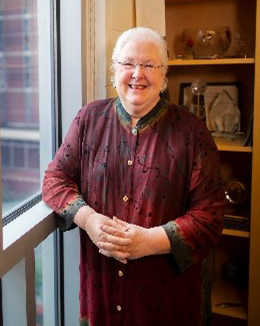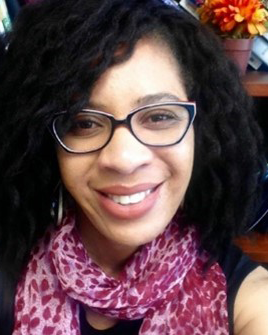Gun Violence: A National Priority for Nurse Researchers
Webinar Description
Gun violence is a national public health concern that affects the lives of all Americans. Nursing researchers are well positioned to design and execute studies to reduce gun violence. The panel of national leaders in gun violence research will be discussing their research trajectories, funding opportunities, policy implications, the importance of interprofessional teams when researching gun violence, and how to live safely in world with guns.
Note: Recording of the webinar will be available soon after the webinar airs. Visit AACN's On-Demand Webinars to watch.
To Register:
For AACN Members, click on the "Register" button on the left side of the screen.
For Non-AACN members, click on the registration button below.
Non-AACN Member Registration Form
Speakers

Therese S. Richmond, PhD, RN, FAAN
Andrea B. Laporte Professor of Nursing
Associate Dean for Research & Innovation
University of Pennsylvania School of Nursing
Dr. Richmond is passionate about using nursing science to prevent injury and violence and improve outcomes, particularly in patients from vulnerable urban populations worldwide – those who live on the margins of society, have limited resources, or live in pervasively violent communities. An early clinical position in a Washington, DC trauma ICU and resuscitation unit sparked Dr. Richmond’s interest in preventing injuries and her curiosity about survivors’ quality of life. This experience led to specialization in nursing care for victims of injury and violence, including co-founding the Firearm & Injury Center at Penn two decades ago and which now is a vibrant interdisciplinary research center: the Penn Injury Science Center.

Jacquelyn Campbell, PhD, MSN, RN, FAAN
Professor
Anna D. Wolf Chair
John Hopkins School of Nursing
Dr. Campbell is a national leader in research and advocacy in the field of domestic and intimate partner violence. She has authored or co-authored more than 230 publications and seven books on violence and health outcomes. Her studies paved the way for a growing body of interdisciplinary investigations by researchers in the disciplines of nursing, medicine, and public health. Her expertise is frequently sought by national and international policy makers in exploring IPV and its health effects on families and communities. As a nurse educator and mentor, Dr. Campbell leads by example in inspiring new generations of nurse researchers. Her BSN, MSN, and PhD are from Duke University, Wright State University, and the University of Rochester. She teaches an undergraduate and MSN elective in Family Violence as well as in the PhD program and is the PI of an NIH-funded (T32) fellowship that provides funding for pre- and postdoctoral fellows in violence research.
Elected to the Institute of Medicine in 2000, Dr. Campbell also was the Institute of Medicine/American Academy of Nursing/American Nurses' Foundation Senior Scholar in Residence and was founding co-chair of the IOM Forum on the Prevention of Global Violence. Other honors include the Pathfinder Distinguished Researcher by the Friends of the National Institute of Health National Institute for Nursing Research, Outstanding Alumna and Distinguished Contributions to Nursing Science Awards, Duke University School of Nursing, the American Society of Criminology Vollmer Award, and being named one of the inaugural 17 Gilman Scholars at Johns Hopkins University. She is on the Board of Directors for Futures Without Violence, is an active member of the Johns Hopkins Women’s Health Research Group, and has served on the boards of the House of Ruth Battered Women's Shelter and four other shelters. She was a member of the congressionally appointed U.S. Department of Defense Task Force on Domestic Violence.

Sara Jacoby, PhD, MPH, MSN
Assistant Professor of Nursing
Assistant Professor of Nursing in Surgery
University of Pennsylvania School of Nursing
Dr. Jacoby combines nursing and public health in her approach to injury science and urban health research. As a nurse in a Philadelphia ICU, Dr. Jacoby was witness to the profound trauma and violence that impacted the lives of hospitalized patients and their families. This inspires her scholarship on the experience of injured people and the socio-structural etiologies of racial and ethnic disparities in trauma, violence, and opportunities for health.
A Senior Scholar at the Penn Injury Science Center, Dr. Jacoby’s research is focused on identifying why injuries occur where they do in urban spaces, the experiences of injured people as they recover in their homes and communities, and how we might support health systems and urban environments to enhance safety and improve injury outcomes. Her current research focuses on identifying the potential of mobile technology to better elicit patient-reported long-term outcomes after trauma in effort to identify pathways for a stronger continuum of health and social care after hospitalization. Dr. Jacoby’s research is also focused on the social and health consequences of intersections between emergency medical interventions and law enforcement activities in response to violence.

Shalanda A. Bynum, PhD, MPH
Program Director
National Institute of Nursing Research
Dr. Bynum is a socio-behavioral scientist who joined NINR from the Center for Scientific Review where she served as a Scientific Review Officer in the Division of AIDS, Behavioral and Population Sciences. She oversees a research grant portfolio focused broadly on the social determinants of health and health equity; violence, adversity, trauma; and sexual health.
Prior to her NIH service, Dr. Bynum was an assistant professor at the Uniformed Services University of the Health Sciences. Her research program focused on addressing the unequal burden of cancer and other diseases among minority populations. More specifically, her work involved understanding and intervening upon the lived experiences that produce health inequities and perpetuate health disparities. These factors centered on literacy and language, geography, historical mistrust, healthcare system failures, and other social factors.
Dr. Bynum holds a BS in psychology from Florida A&M University and a MPH and PhD in health promotion from the University of South Carolina at Columbia. Dr. Bynum also completed a postdoctoral fellowship in behavioral oncology at H. Lee Moffitt Cancer Center and Research Institute.
Moderator:

Angela Amar, PhD, RN, FAAN
Professor and Dean
University of Nevada Las Vegas
Dr. Amar joined UNLV School of Nursing as dean in January 2018. She is excited by the university’s top tier initiative and the school of nursing’s amazing students, faculty, and staff. Prior to her current role, Dr. Amar led the undergraduate programs including pre-nursing courses, nursing, and accelerated programs at Emory University. Through her vision and innovation, the Nell Hodgson Woodruff School of Nursing advanced the learning and leadership among undergraduate students, particularly within forensic nursing and cultural diversity. Her funded projects included an NIH-sponsored Bridges to Baccalaureate Program and an HRSA funded Nursing Workforce Diversity grant.
Prior to joining Emory University, she developed forensic nursing programs for Georgetown University and Boston College and established an educational model for nursing schools nationwide. Her research focuses on sexual assault, dating violence, and mental health responses to traumatic experiences has received support from the Robert Wood Johnson Foundation, the National Institute of Child Health and Human Development, and the National Institute of Nursing Research. She has published papers about dating violence and sexual assault and is active in university service related to violence and diversity.
Dr. Amar dedicates her career to enhancing diversity within nursing leadership and improving care and support for survivors of violence and trauma when they enter the healthcare system. An advanced practice psychiatric nurse, she co-authored an award-winning book on forensic nursing titled A Practical Guide to Forensic Nursing.
Pricing and CE Credit
This webinar is free for all to attend.
Continuing Education Credits
 The American Association of Colleges of Nursing is accredited as a provider of nursing continuing professional development by the American Nurses Credentialing Center’s Commission on Accreditation. The Association of Schools and Programs of Public Health (ASPPH) works with the National Board of Public Health Examiners (NBPHE) to provide CPH credits.
The American Association of Colleges of Nursing is accredited as a provider of nursing continuing professional development by the American Nurses Credentialing Center’s Commission on Accreditation. The Association of Schools and Programs of Public Health (ASPPH) works with the National Board of Public Health Examiners (NBPHE) to provide CPH credits.
